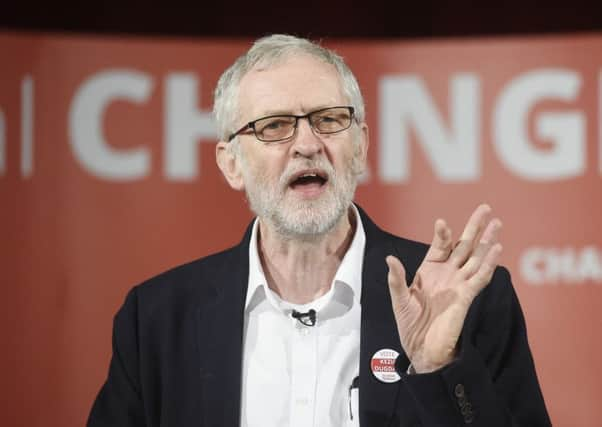Leaders: Corbyn has power to shore up faltering '˜In' campaign


Jeremy Corbyn’s first major speech in the European Union debate has been eagerly awaited by all sides, not least because of what has been perceived as his somewhat lukewarm commitment to the European project and his vote to leave the EU’s forerunner, the European Economic Community, in the 1975 referendum.
But now that Mr Corbyn has been in office for some time and has a duty to listen to a range of views, he has backed staying in, pinning his colours to the Remain camp.
Advertisement
Hide AdAdvertisement
Hide AdThe stand-out part of his speech, and which may help a good number of undecided voters make up their minds, was when he said: “You cannot build a better world unless you engage with the world, build allies and deliver change. The EU, warts and all, has proved itself to be a crucial international framework to do that.”
His message was if we withdraw, not only will Europe be fragmented, but it will also make working together much harder.
Meanwhile, the main thrust of his speech was workers’ rights, which might seem rather an odd choice given that it has hardly been one of the major issues flagged up so far.
However, the fact he also had a go at his traditional adversaries the Tories by saying that if the UK came out of Europe the Conservatives would abolish workers’ rights, such as equal pay and maternity leave, shows he was being careful not to alienate his supporters.
In this he is probably showing that Labour have learned from painful experience in Scotland, where being seen to have stood alongside the Conservatives in the Better Together campaign cost the party votes. This worry must have been underlined by the positive response to Mr Corbyn’s speech from David Cameron yesterday, who was manning the phones at Remain HQ.
But the choice of subject was astute and clever. Mr Corbyn knows he has to get Labour voters backing membership of the European Union, and terms and conditions and employment rights backed up by EU law are something they hold dear.
The question now is what impact Mr Corbyn’s stance will have. EU opinion polls have been shifting away from Mr Cameron, who has not had his troubles to seek lately. The “Stay” campaign needs a boost.
While the general verdict on the Labour leader’s speech was that it was underwhelming, he has the potential to influence the decision of around nine million supporters.
Advertisement
Hide AdAdvertisement
Hide AdDespite the turnaround in his views since 1975 he has stressed there is nothing half-hearted about the Labour Party’s campaign, and that it is far better to remain in the EU and work to try to change the aspects which aggravate the British public and businesses.
Labour MP Kate Hoey, an “Out” supporter, expressed her view about Mr Corbyn’s stance, saying: “We know he doesn’t really mean it, no matter how much he tries to pretend he does.”
This may fall on deaf ears as a political consensus begins to grow linking both Left and Right. The old adage is that people vote with their feet. For once it seems left and right are headed in the same direction.
Scrutiny of PFI contracts essential
The admission that council officials did not inspect school buildings in Edinburgh built under the PPP (public-private partnership) scheme as work went along, but rather waited until the project was complete, will surprise those who have endured a bombardment of tight regulations for a skylight or kitchen extension.
Firstly it raises the question of what other parts of that contract might be considered unusual practice. And secondly, we need to know how many other PPP projects in Scotland could have followed similarly unsatisfactory procedures.
In Edinburgh, thousands of families are having to make ad hoc childcare arrangements during school closures, while senior pupils ready to take exams are worrying about the effect this will have on their future.
As with the fiasco with the trams project in Edinburgh, we need a thorough analysis of contracts to highlight any anomalies and discover whether any other potential omissions could have an impact on public safety.
We must also get to the root of who precisely was responsible for the contracts in question.
Advertisement
Hide AdAdvertisement
Hide AdPrivate finance schemes are a legacy of both Conservative and Labour. They were a Conservative invention, adopted by Labour as a means of getting access to funding.
While there was some disquiet at the time of the funding scheme introduction, opponents were categorised as “dinosaurs” unwilling to change to survive. It was an era when easy access to buying through credit cards was being encouraged, with little attention to the fine print detailing interest charged.
It may be late in the day, but careful scrutiny of private finance contracts in the public sector is now urgent and essential.